This article concerns the period 79 BC – 70 BC.

Marcus Licinius Crassus was a Roman general and statesman who played a key role in the transformation of the Roman Republic into the Roman Empire. He is often called "the richest man in Rome".

Year 72 BC was a year of the pre-Julian Roman calendar. At the time it was known as the Year of the Consulship of Publicola and Lentulus. The denomination 72 BC for this year has been used since the early medieval period, when the Anno Domini calendar era became the prevalent method in Europe for naming years

Spartacus is a 1960 American epic historical drama film starring Kirk Douglas in the title role, a slave who leads a rebellion against Rome and the events of the Third Servile War. Adapted by Dalton Trumbo from Howard Fast's 1951 novel of the same title, the film was directed by Stanley Kubrick. In support of Douglas as Spartacus, the film stars Laurence Olivier as Roman general and politician Marcus Licinius Crassus, Charles Laughton as Sempronius Gracchus, Peter Ustinov as slave trader Lentulus Batiatus, and John Gavin as Julius Caesar. Jean Simmons played Spartacus' wife Varinia, a fictional character, and Tony Curtis played the fictional slave Antoninus.

The Third Servile War, also called the Gladiator War and the War of Spartacus by Plutarch, was the last in a series of slave rebellions against the Roman Republic known as the Servile Wars. This third rebellion was the only one that directly threatened the Roman heartland of Italy. It was particularly alarming to Rome because its military seemed powerless to suppress it.
Spartacus is a historical novel by the Scottish writer Lewis Grassic Gibbon, first published in 1933 under his real name of James Leslie Mitchell.
Crixus was a Gallic gladiator and military leader in the Third Servile War between the Roman Republic and rebel slaves. Born in Gaul, he was enslaved by the Romans under unknown circumstances and trained as a gladiator in Capua. His name means "one with curly hair" in Gaulish.
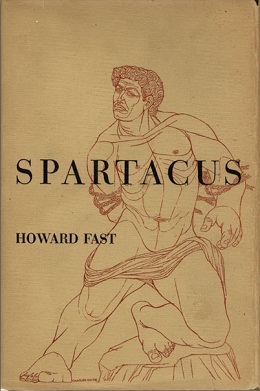
Spartacus is a 1951 historical novel by American writer Howard Fast. It is about the historic slave revolt led by Spartacus around 71 BC. The book inspired the 1960 film directed by Stanley Kubrick and the 2004 TV adaptation by Robert Dornhelm.
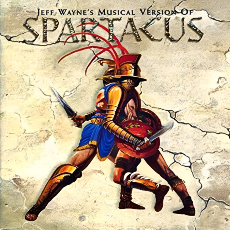
Jeff Wayne's Musical Version of Spartacus is a 1992 concept album produced and composed by Jeff Wayne with Lyrics by Gary Osborne, telling the story of Roman gladiator, Spartacus.

Spartacus is a 2004 North American miniseries directed by Robert Dornhelm and produced by Ted Kurdyla from a teleplay by Robert Schenkkan. It aired over two nights on the USA Network, and stars Goran Visnjic, Alan Bates, Angus Macfadyen, Rhona Mitra, Ian McNeice, Ross Kemp and Ben Cross. It is based on the 1951 novel of the same name by Howard Fast.
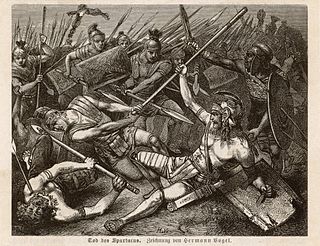
Spartacus was a Thracian gladiator (Thraex) who, along with Crixus, Gannicus, Castus, and Oenomaus, was one of the escaped slave leaders in the Third Servile War, a major slave uprising against the Roman Republic. Little is known about him beyond the events of the war, and surviving historical accounts are sometimes contradictory. All sources agree that he was a former gladiator and an accomplished military leader.
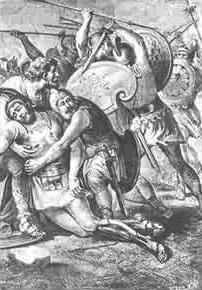
The Battle of the Silarius River was the final, decisive action of the Roman Servile Wars. It occurred near the mouth of modern Sele River, southern Campania, southern Italy.
Spartacus is an American television series produced in New Zealand that premiered on Starz on January 22, 2010, and concluded on April 12, 2013. The fiction series was inspired by the historical figure of Spartacus, a Thracian gladiator who from 73 to 71 BC led a major slave uprising against the Roman Republic departing from Capua. Executive producers Steven S. DeKnight and Robert Tapert focused on structuring the events of Spartacus' obscure early life leading up to the beginning of historical records.
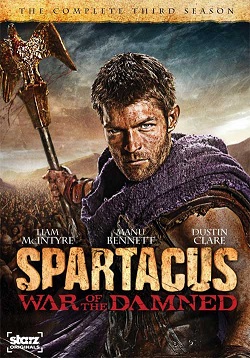
Spartacus: War of the Damned is the third and final season of the American television series Spartacus, a Starz television series, which follows Spartacus: Vengeance. The series was inspired by the historical figure of Spartacus, a Thracian gladiator who, from 73 to 71 BC, led a major slave uprising against the Roman Republic. It premiered on January 25, 2013, and concluded on April 12, 2013.

The Battle of Vesuvius was the first conflict of the Third Servile War which pitted the escaped slaves against a military force of militia specifically dispatched by Rome to deal with the rebellion.
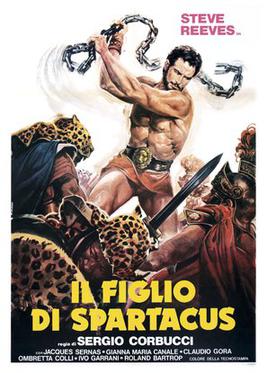
The Slave is a 1962 Italian peplum film directed by Sergio Corbucci and starring Steve Reeves and Gianna Maria Canale. It is an unofficial sequel to Stanley Kubrick's 1960 film Spartacus, as it includes a mention of the character Varinia, who was specifically created for the novel template for that film. The running time was 100 minutes.

Sins of Rome is a 1953 historical drama film directed by Riccardo Freda and loosely based on the life story of Spartacus. The rights of film's negatives and copies were bought by the producers of Stanley Kubrick's 1960 film Spartacus, as to prevent eventual new releases of the film that could have damaged the commercial outcome of Kubrick’s film; this resulted in Sins of Rome's withdrawal from market for about thirty years.

The Gladiator is a tragic melodrama in five acts written by Robert Montgomery Bird originally starring Edwin Forrest. It first premiered on September 26, 1831, at the Park Theatre in New York City.

The Battle of Picenum was one of the major battles of the Third Servile War, between the slave army of Spartacus and the combined consular forces of the Roman Republic led by the two consuls Lucius Gellius and Gnaeus Cornelius Lentulus Clodianus. It took place in Picenum region in 72 BC. It was a victory for Spartacus, and it proved to be his greatest triumph of the war.













